| Srl | Item |
| 1 |
ID:
058081
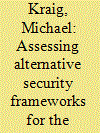

|
|
|
| 2 |
ID:
126692
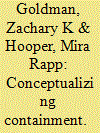

|
|
|
|
|
| Publication |
2013.
|
| Summary/Abstract |
Zachary K. Goldman and Mira Rapp-Hooper discuss American security interests in the Persian Gulf region and the prospects for effective cooperation among Gulf States to contain Iran. They ?nd that it is unlikely that the United States will be able to establish a containment regime that relies upon the Gulf Cooperation Council and that informal, bilateral ties to states in the region are a preferable policy recourse.
|
|
|
|
|
|
|
|
|
|
|
|
|
|
|
|
| 3 |
ID:
180317
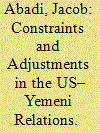

|
|
|
|
|
| Summary/Abstract |
This article analyzes the course of US–Yemeni relations from the 1940s to the present and aims to explain the reasons for the twists and turns in bilateral relations. It argues that the US government never developed a unique “Yemen policy” and that its attitude toward that country was determined largely by its ties with Saudi Arabia. Yemen began to loom large in US foreign policy in the early 1960s when Egyptian President Gamal Abd al-Nasser intervened on behalf of the Republicans who staged a coup against the Royal imamate regime, which relied on Saudi support. The article shows that President John Kennedy looked favorably on the new Republican regime in Yemen despite the robust relations that existed between the United Statesand Saudi Arabia. In addition, it argues that despite the war in Yemen, which lasted from 1962 to 1970 and caused instability in this region, this country did not loom large in US foreign policy. This was largely due to the British presence in south Yemen and especially in the port of Aden, which lasted until 1967. The article shows how the British withdrawal from Aden increased Yemen’s value in the eyes of US policymakers, but even then, no effort was made to fashion a unique policy toward this country. In addition, the article demonstrates how Washington’s attitude changed in 1969 when the country was divided into North Yemen, which tended to regard the Soviet Union as its protector and South Yemen, which continued to rely on US aid. And lastly, the article traces US–Yemeni relations from 1990, when the country reunited, until the present. It demonstrates how the bilateral relations were affected by the superpowers’ rivalry during the Cold War, the fight against terrorism, and disagreement between the Republican and the Democratic parties in the United States.
|
|
|
|
|
|
|
|
|
|
|
|
|
|
|
|
| 4 |
ID:
030620
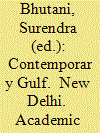

|
|
|
|
|
| Publication |
New Delhi, Academic Press, 1980.
|
| Description |
xii, 148p.hbk
|
|
|
|
|
|
|
|
|
|
|
|
Copies: C:1/I:0,R:0,Q:0
Circulation
| Accession# | Call# | Current Location | Status | Policy | Location |
| 018848 | 953.05/BHU 018848 | Main | On Shelf | General | |
|
|
|
|
| 5 |
ID:
184875
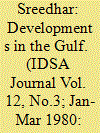

|
|
|
| 6 |
ID:
132345
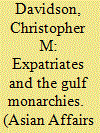

|
|
|
|
|
| Publication |
2014.
|
| Summary/Abstract |
For many years huge expatriate populations have played a much documented role in the economic development of the Gulf monarchies. But a less well-told story is how expatriates have also contributed to their political stability. As non-citizens their presence in such large numbers has reinforced the elite status of most citizens in the region - an important non-pecuniary legitimacy resource for the various ruling dynasties. Moreover, the primarily employment-driven status of expatriates has meant that they have usually adopted either an apolitical or even prostatus quo stance. In some cases their perceived loyalty has led to selective naturalization or even direct co-option into security services. Disrupting this decades-old relationship, however, have been the recently changing political and economic circumstances of the Gulf monarchies. Already decisions have been made to reduce significantly expatriate populations due to accumulating pressures. Such measures are likely to threaten the historic political advantages the presence of expatriates has provided for these polities.
|
|
|
|
|
|
|
|
|
|
|
|
|
|
|
|
| 7 |
ID:
117535
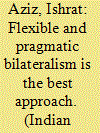

|
|
|
| 8 |
ID:
076643
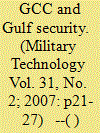

|
|
|
| 9 |
ID:
058080
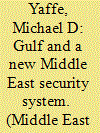

|
|
|
| 10 |
ID:
011646
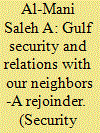

|
|
|
|
|
| Publication |
Sept 1996.
|
| Description |
295-301
|
|
|
|
|
|
|
|
|
|
|
|
|
|
|
|
| 11 |
ID:
011647
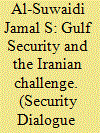

|
|
|
|
|
| Publication |
Sept 1996.
|
| Description |
277-294
|
|
|
|
|
|
|
|
|
|
|
|
|
|
|
|
| 12 |
ID:
188168
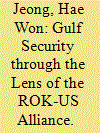

|
|
|
|
|
| Summary/Abstract |
An analysis of South Korea’s independent deployment of the Cheonghae Unit to the Strait of Hormuz sheds light on the fragmentation of media and political discourses in the country. Empirical evidence from five major South Korean newspaper outlets reveals that the South Korean government’s pre-emptive securitisation presents a wide gap in manifest and latent security interests between the state and society. Securitisation is debated with regard to the two interconnected questions of South Korea’s military deployment to the Middle East and the future of the Korean Peninsula – both of which are ultimately tied to the question of Seoul’s commitment to the US alliance.
|
|
|
|
|
|
|
|
|
|
|
|
|
|
|
|
| 13 |
ID:
061831
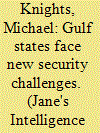

|
|
|
| 14 |
ID:
058068
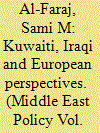

|
|
|
| 15 |
ID:
098890


|
|
|
|
|
| Publication |
2009.
|
| Summary/Abstract |
The following is an edited transcript of the fifty-eighth in a series of capital hill conference convened by the Middle East policy council.The meeting was held on October 23, 2009, in the United States capital building with Thomas R Mattair moderating.
|
|
|
|
|
|
|
|
|
|
|
|
|
|
|
|
| 16 |
ID:
145294
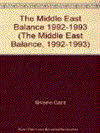

|
|
|
|
|
| Publication |
Jerusalem, Jerusalem Post, 1993.
|
| Description |
ii, 514p.: mapshbk
|
| Series |
Jaffee Center for Strategic Studies
|
| Standard Number |
9654590034
|
|
|
|
|
|
|
|
|
|
|
|
Copies: C:1/I:0,R:1,Q:0
Circulation
| Accession# | Call# | Current Location | Status | Policy | Location |
| 035275 | 355.033056/GAZ 035275 | Main | On Shelf | Reference books | |
|
|
|
|
| 17 |
ID:
178049
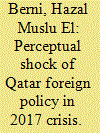

|
|
|
|
|
| Summary/Abstract |
The Qatar crisis of June 2017 commenced without a warning and restored overlooked regional security dynamics to the state, the political elite, and the Qatari society at large. Qatar was cautious about the diversions of its foreign policy from regional security perceptions of its neighbors, even before the crisis, despite its failure to predict imminent political consequences, emerging from some states within the Gulf Cooperation Council (GCC). In the aftermath of the crisis, critical narratives of the neighboring states on Qatar’s independent policies intimidated at the top leadership level and necessitates an analysis of the crisis, navigating through domestic settings facing systemic and regional pressures. This article aims to analyze the impact of the crisis on the perceptions of Qatari decision-makers, its society, and its tribes using the “perceptual shock” concept of neoclassical realism. It contends that despite the ongoing regional isolation of Qatar by the Saudi-led quartet, comprising Bahrain, the United Arab Emirates (UAE), and Egypt, Qatar’s state apparatus and its relations with the society continued to strengthen due to the complex relationship between the domestic variables and systemic factors, and their relation to regional dynamics.
|
|
|
|
|
|
|
|
|
|
|
|
|
|
|
|
| 18 |
ID:
058070
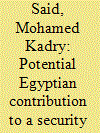

|
|
|
| 19 |
ID:
129662
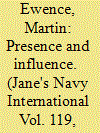

|
|
|
| 20 |
ID:
052528
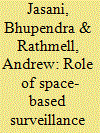

|
|
|
|
|
| Publication |
Emirates Center For Strategic and Research, 1998.
|
| Description |
81p.
|
|
|
|
|
|
|
|
|
|
|
|
Copies: C:1/I:0,R:0,Q:0
Circulation
| Accession# | Call# | Current Location | Status | Policy | Location |
| 041601 | 358.8/JAS 041601 | Main | On Shelf | General | |
|
|
|
|